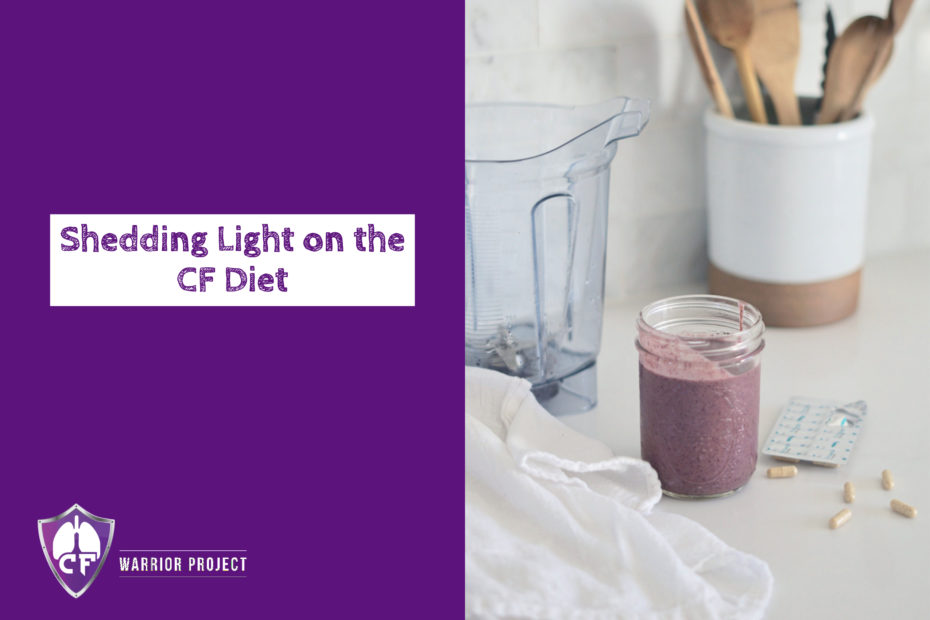Shedding Light on the CF Diet and How I approach this High-calorie, High-fat Lifestyle with My Patients
— Paige Riley, RD, LDClinical Dietitian II, Emory’s Adult Cystic Fibrosis Clinic
Cystic fibrosis is a “hypermetabolic” disease, meaning the disease itself uses A LOT of energy (in the form of calories), and the body needs an abundant amount of daily caloric intake just to maintain normal bodily functions. Someone with CF uses about double the amount of energy as a non-CF person of the same age, weight, and height just to BREATHE in and out.
CF also causes a lot chronic inflammation in the lungs, which requires calories for repairing and rebuilding the damaged tissues. On top of that, about 90% of CF patients have exocrine pancreatic insufficiency (EPI), where the pancreas does not excrete digestive enzymes that are vital to the proper breakdown and absorption of nutrients and calories from food. CF patients with EPI take oral enzymes by mouth daily with every food and snack to help with the digestion and absorption process. But if you ask any CF patient taking these, enzymes don’t always do their job correctly, requiring patients to eat EXTRA food to make up for the calories and nutrients that can get lost in their bowel movements.
All of that being said, the CF diet focuses on high-calorie, high-FAT intake. Per gram, fat has about 9 calories, whereas protein and carbs only have about 4 calories. A CF patient (especially when exacerbated by difficult breathing and other episodes) is prone to weight loss because of the conditions above PLUS increased inflammation and fever (requiring more calories to maintain body weight) from the infection. A high-fat diet supplies CF patients an adequate amount of calories without a ton of volume taking up room in their stomachs.
For example, a ¼ cup of any type of nut is about 160 calories, which is a very small volume and provides good fats, protein, fiber, and other vital nutrients to CF patients like vitamin E. To get the same amount of calories from broccoli (which is a carb), a CF patient would have to eat almost 5 cups! Not to discredit the benefits of eating broccoli, but in order to maintain adequate weight and make sure CF patients eat enough food, we focus on high-calorie, high-fat options such as:
- Whole milk/heavy cream in their cereal, coffee, oatmeal, baking, etc.
- 2 tablespoons of olive oil or butter (about 200 calories) on potatoes, pastas, vegetables, and even meats
- Double meat, cheese, and avocado on sandwiches with extra mayo on thick bread slices
- Full-fat yogurts, cheese, and other dairy products
- 3-egg omelets with sausage, cheese, avocado, and extra butter or olive oil
- 4 tablespoons of peanut butter (about 400 calories) on PBJ sandwiches
- Using oral nutrition supplements (Ensure, Boost, Kate’s Farms, Scandishake, ENU, etc.) when taking vitamins and other oral medications instead of water for sneaking in added nutrition and calories
High-fat foods also provide an extra source of fat-soluble vitamins A, D, E, and K, which CF patients tend to be lower in since they can lose a lot of fat through their stools. CF patients are required to take these “ADEK” vitamins in the form of a supplements every day for maintaining adequate levels. Taking these vitamins with high-fat foods (and enzymes, of course) help these nutrients absorb better. These vitamins are vital to the health of CF patients, considering that vitamins A and E are powerful antioxidants that can combat inflammation in the body, and vitamin D is extremely important in preventing bone disease and has been shown to help improve immunity.
This might sound like a “dream diet” to the non-CF population, but CF patients sometimes feel “food fatigued” or develop food aversions from having to eat so many calories in one day (anywhere from 2,500-4,500 depending on the age, weight, and height of the individual). CF patients have A LOT of daily requirements and treatments in order to stay healthy, including but not limited to twice-a-day airway clearance, that can take almost an hour each to complete; oral enzymes with all food put into their bodies; endless amounts of oral medications multiples times per day; and on top of that, high-calorie meals and snacks multiple times per day.
CF maintenance is a full-time job, and eating can begin to feel like another task in this endless day of CF requirements, especially if the CF patient is not feeling well or on the verge of an exacerbation. No one likes to eat 4,500 calories when they feel sick or have a fever, including CF patients. So high-fat foods also offer the benefit of being low-volume and nutrient dense. CF patients can keep a jar of nuts or nut butter by their desks or Boost Plus cans in their backpacks or workbags for a high-calorie, low-volume snack between meals.
Each CF patient is different in how he or she eats and what the patient’s preferences are, so it’s hard to give examples of what EVERY CF patient should eat in a day. The focus should definitely be on high-calorie, high-fat options, full of vital nutrients that have been explored and discussed with his or her CF dietitian.
I hope this gives you some insight on the role of CF dietitians and how we help maintain weight in our patients without creating food fatigue. The CF patient is very complex, including when it comes to diet, so please don’t hesitate to reach out to me with any additional questions. As you can see, I love my job and talking about CF.
